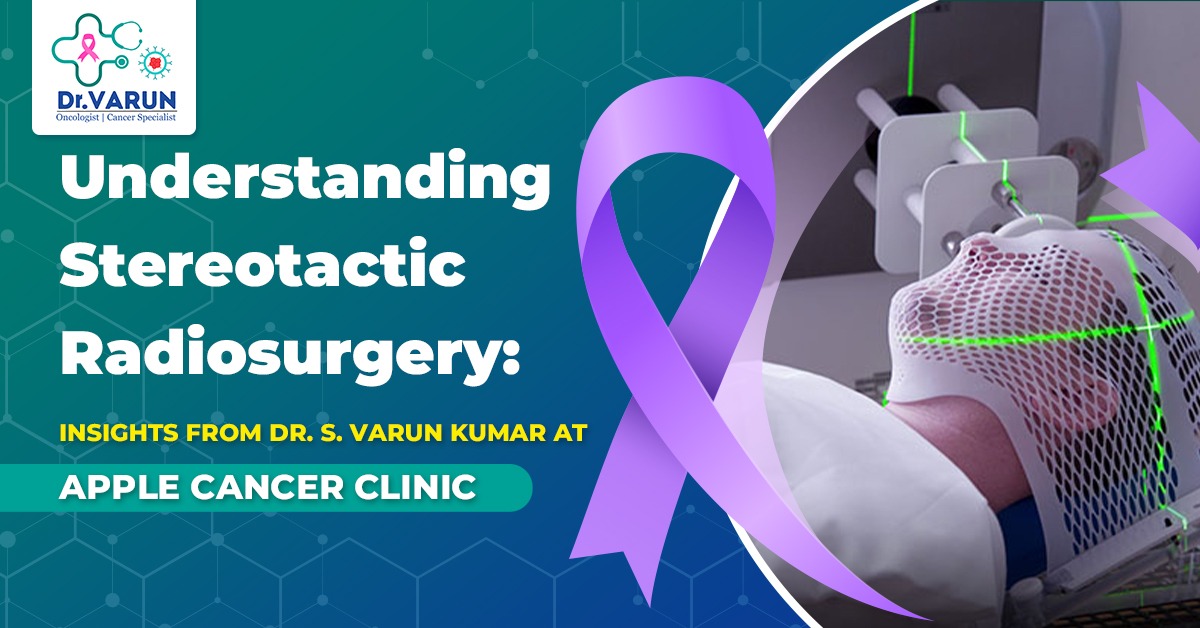Introduction
In recent years, stereotactic radiosurgery (SRS) has emerged as a revolutionary treatment option in cancer care, particularly for certain brain and spinal tumors, as well as non-cancerous conditions. Known for its precision and effectiveness, SRS uses high-dose radiation to target tumors with minimal impact on surrounding healthy tissue. Patients often experience fewer side effects, quicker recovery times, and excellent results. At Apple Cancer Clinic in Bengaluru, Dr. S. Varun Kumar, a highly experienced radiation oncologist, specializes in SRS and is committed to offering patients state-of-the-art cancer treatment. This blog will delve into what stereotactic radiosurgery entails, its benefits, and key insights from Dr. Varun Kumar, who has extensive training and expertise in this advanced technique.
What is Stereotactic Radiosurgery (SRS)?
Stereotactic radiosurgery, despite its name, is a non-surgical procedure that delivers highly focused radiation beams to treat specific areas in the brain, spine, and other parts of the body. Using advanced imaging and computer systems, SRS delivers precise, high-dose radiation in a single session or a few sessions (often called stereotactic body radiotherapy, or SBRT, when used on the body). By precisely targeting the tumor, SRS minimizes damage to surrounding healthy tissues, making it a preferred option for delicate areas.
Key Features of Stereotactic Radiosurgery:
- Precision: Focuses on a small area, sparing healthy tissue.
- Non-Invasive: No incision or general anesthesia required.
- Quick Recovery: Most patients resume normal activities within a day.
- High Success Rates: Particularly effective for small tumors or well-defined lesions.
- Versatile Applications: Effective for both malignant and benign conditions, including brain metastases, arteriovenous malformations, and trigeminal neuralgia.
At Apple Cancer Clinic, Dr. S. Varun Kumar employs cutting-edge technologies, including CyberKnife and TomoTherapy, to ensure patients receive the best possible care. With his extensive training in SRS, Dr. Varun has successfully treated numerous patients, offering them hope and effective treatment options.
Benefits of Stereotactic Radiosurgery
SRS offers several advantages over conventional radiation and surgical treatments:
- Minimally Invasive: Unlike traditional surgery, SRS requires no incisions or hospitalization, making it an ideal choice for patients who may not be suitable for surgery due to health concerns.
- Precision and Accuracy: Advanced imaging and computerized planning allow radiation to be delivered with pinpoint accuracy, reducing the risk of side effects and preserving nearby healthy tissue.
- Short Treatment Time: SRS often requires only one or a few sessions, which is a significant advantage for patients who prefer minimal interruption to their daily lives.
- Reduced Side Effects: Due to its targeted nature, SRS has fewer side effects than traditional radiation treatments, especially in sensitive areas like the brain.
- Effective for Recurrent Tumors: SRS can also be used to treat tumors that have recurred after initial treatment, offering patients an additional treatment option.
5 FAQs about Stereotactic Radiosurgery
- What conditions can be treated with Stereotactic Radiosurgery?
Stereotactic radiosurgery is primarily used to treat small or well-defined tumors, particularly in the brain and spine. Common conditions include brain metastases, arteriovenous malformations (AVMs), trigeminal neuralgia, and certain types of spinal tumors. SRS is also effective in treating some non-cancerous conditions, offering patients more options for conditions that are challenging to treat surgically. - Is SRS painful, and what should I expect during the procedure?
SRS is a painless, non-invasive procedure. During the treatment, the patient lies on a treatment table while the machine targets the tumor with precise beams of radiation. You won’t feel the radiation itself. The entire procedure, including preparation, usually lasts a few hours, but the radiation delivery itself takes only a few minutes. Most patients can return to their regular activities the next day. - What are the side effects of Stereotactic Radiosurgery?
Side effects are generally minimal due to the precision of the treatment. However, some patients may experience mild fatigue, temporary hair loss (if treated near the scalp), or localized swelling. Rarely, patients might experience more serious side effects depending on the location and size of the treated area. Dr. Varun Kumar and his team at Apple Cancer Clinic monitor patients closely to manage any side effects effectively. - How does SRS differ from conventional radiation therapy?
Unlike conventional radiation therapy, which involves multiple low-dose sessions over several weeks, SRS delivers high-dose radiation in one or a few sessions. SRS is more precise, targeting only the tumor with minimal exposure to surrounding tissues. This makes it particularly effective for treating small, well-defined tumors in delicate areas, where precision is critical. - Why should I choose Apple Cancer Clinic for my SRS treatment in Bengaluru?
Apple Cancer Clinic, led by Dr. S. Varun Kumar, is one of Bengaluru’s top clinics for radiation oncology, offering cutting-edge SRS technology and personalized treatment plans. Dr. Varun’s expertise in CyberKnife and other advanced techniques allows him to provide highly effective, individualized care for each patient. With a focus on patient comfort, safety, and positive outcomes, Apple Cancer Clinic is a trusted choice for patients seeking advanced cancer treatment in Bengaluru.
Patient Success Stories
At Apple Cancer Clinic, numerous patients have benefitted from Dr. Varun Kumar’s expertise in stereotactic radiosurgery. One such patient, a middle-aged woman diagnosed with a brain tumor, found relief and recovery through SRS. She expressed her gratitude, saying, “Dr. Varun and his team gave me hope when surgery wasn’t an option. I was able to get treated and return to my life much faster than I imagined.” Such stories highlight the impact of SRS and Dr. Varun’s dedication to his patients.
Another case involved a man in his 60s with recurrent spinal metastases who could not undergo traditional surgery due to age and other health complications. SRS provided an effective alternative, and his follow-up scans showed a significant reduction in tumor size, allowing him a better quality of life.
These success stories illustrate the potential of SRS for treating complex cases where conventional treatments may fall short. Dr. Varun Kumar’s expertise and commitment to innovative care make Apple Cancer Clinic a valuable resource for patients seeking state-of-the-art treatment options.
Conclusion
Stereotactic radiosurgery represents a breakthrough in radiation oncology, providing patients with a safe, effective, and minimally invasive treatment for various tumors and conditions. Under the expert guidance of Dr. S. Varun Kumar, Apple Cancer Clinic in Bengaluru has become a leading center for SRS, offering patients access to advanced technology and compassionate care.
If you or a loved one is facing a diagnosis that may benefit from stereotactic radiosurgery, consider consulting Dr. Varun at Apple Cancer Clinic. With his expertise in the latest radiation oncology techniques, Dr. Varun can provide personalized advice and treatment options tailored to your unique needs. Embrace the opportunity to explore advanced treatment options and take a step toward recovery with confidence.
By sharing success stories and addressing common concerns, we hope to provide you with the information and confidence needed to navigate your cancer journey with hope and resilience.
To get more information visit our www.drvarunoncologist.com check out our Apple Cancer Clinic, or call us at +91 9606578058. You can also follow us on Facebook, Instagram, Linked In and X.

